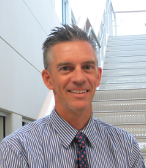Biomechanics, Running, and Research
 In 2014, the city of Jacksonville had limited running science in town despite being
one of the top running cities in the country; Dr. Wight came to Jacksonville University
determined to change that. With internal funding from Jacksonville University and
under the guidance of the University of Calgary Running Injury Clinic, Dr. Wight was
able to develop a biomechanics running lab on campus and become part of the Clinic’s
research network. In that first year, Dr. Wight analyzed about 30 top local runners
and in the next year, the kinesiology graduate program began, where Dr. Wight was
able to use a team of five students to help with the research and gain hands-on experience.
With opportunities expanding, Dr. Wight and his students began collaborating with
the top local running store, 1st Place Sports, who funded a full graduate assistantship
for the laboratory. And by 2017, Dr. Wight had an idea to develop a community running
laboratory at 1st Place Sports, where they provided the loft at the Jacksonville Beach
location for Dr. Wight and his students to work. With additional internal funding,
Dr. Wight and his team were able to acquire the equipment to set up a duplicate lab.
Continuing to expand, they developed a fee-for-service clinic at the 1st Place Sports
lab via a collaboration with JTC Running, the large running club that directs Jacksonville’s
famous race, the Gate River Run 15k. JTC Running funded a graduate assistantship for
this project. Runners paid a fee and received a scientific analysis, slow-motion video
analysis, and consultation to better understand and improve their running biomechanics.
The graduate assistant analyzed runners with assistance from laboratory interns. There
are few “running clinics” in the country that provide these options.
In 2014, the city of Jacksonville had limited running science in town despite being
one of the top running cities in the country; Dr. Wight came to Jacksonville University
determined to change that. With internal funding from Jacksonville University and
under the guidance of the University of Calgary Running Injury Clinic, Dr. Wight was
able to develop a biomechanics running lab on campus and become part of the Clinic’s
research network. In that first year, Dr. Wight analyzed about 30 top local runners
and in the next year, the kinesiology graduate program began, where Dr. Wight was
able to use a team of five students to help with the research and gain hands-on experience.
With opportunities expanding, Dr. Wight and his students began collaborating with
the top local running store, 1st Place Sports, who funded a full graduate assistantship
for the laboratory. And by 2017, Dr. Wight had an idea to develop a community running
laboratory at 1st Place Sports, where they provided the loft at the Jacksonville Beach
location for Dr. Wight and his students to work. With additional internal funding,
Dr. Wight and his team were able to acquire the equipment to set up a duplicate lab.
Continuing to expand, they developed a fee-for-service clinic at the 1st Place Sports
lab via a collaboration with JTC Running, the large running club that directs Jacksonville’s
famous race, the Gate River Run 15k. JTC Running funded a graduate assistantship for
this project. Runners paid a fee and received a scientific analysis, slow-motion video
analysis, and consultation to better understand and improve their running biomechanics.
The graduate assistant analyzed runners with assistance from laboratory interns. There
are few “running clinics” in the country that provide these options.
In the classroom, Dr. Wight teaches all undergraduate and graduate students the methods
they have developed in the running lab, and he has learned that the most effective
way for students to do this is to analyze their own running. In his graduate classes,
Dr. Wight works with each student during labs to optimize their mechanics, just like
he would with runners in the community lab. Each semester, the lab has approximately
8-10 graduate and undergraduate students who take the lead on a study, often presenting
their work at several conferences. To date, the department has had 18 students present
at conferences, and several graduate students who have completed their theses in the
lab.
Dr. Wight is passionate about helping runners optimize their biomechanics, knowing
that when adjustments are made, years of pain and aches can disappear, and runners
can shave 10+ seconds per mile without working any harder. Overall, runners, coaches,
and shoe companies have a very limited understanding of running biomechanics, which
is why Dr. Wight is so passionate about educating his students and the community.
“I’ve been running intensely for years and I strongly believe that optimizing running
biomechanics is the most critical factor for runners. That is why I focus my energy
on biomechanics both personally and in the lab. I plan to continue to work with our
community and JU Athletics to help people optimize their running for performance and
health," says Dr. Wight.
